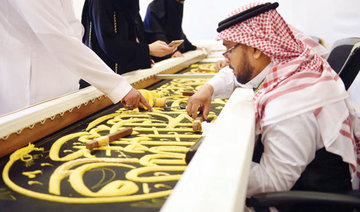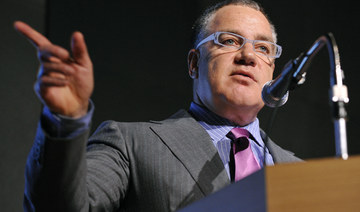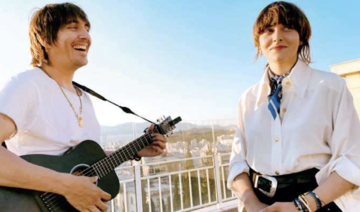MAKKAH: Following the annual custom, the lower part of Kaaba garment (kiswa) was raised and tailors covered the exposed part with a white cotton cloth of about two meters across the four sides.
This procedure is carried out every year as a precautionary measure to prevent people from damaging the kiswa, as they tend to touch the cover during their circumambulations, said Dr. Muhammad Bajouda, director of the King Abdul Aziz Complex for the Kaaba.
The covering of the Kaaba is raised each year as a sign of the beginning of the month of the Hajj.
The kiswa was previously raised on the first day of Dhu Al-Hijjah as an announcement of the advent of the rite and an indication of the beginning of the holy days.
According to Bajouda: “With a decrease in the number of pilgrims, the date of raising the kiswa was put forward, as the numbers were very few and it was difficult for many pilgrims to come in those years.” But with the improvement of economic conditions and means of transport, the date was changed to the middle of Dhu’l-Qi’dah.
He pointed out that the number of pilgrims, which exceeds 2 million, is one of the reasons for raising the kiswa — to preserve it.
“The kiswa is raised from the mataf the equivalent of three meters out of the 14-meter height of the Kaaba. Eleven meters remain covered until the 12th of the month of Muharram.” Bajouda said.
This period passes by changing this cover once a year, during the Hajj season, on the morning of the day of Arafah, the ninth of Dhu Al-Hijjah, to return the covering of the Kaaba until the 12th of Muharram.
“On the eighth day of the month of Dhu Al-Hijjah every year, the 52 gilded parts are removed,” he said.
Kaaba kiswa raised indicating beginning of Hajj season
Kaaba kiswa raised indicating beginning of Hajj season
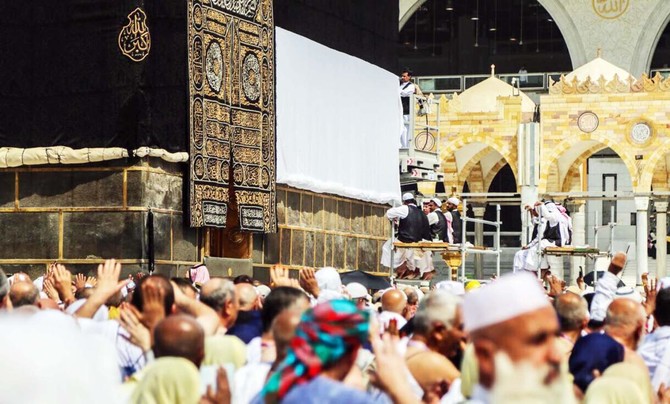
Sara Philby, granddaughter of iconic explorer Abdullah Philby, recounts his influence on her life and pursuits
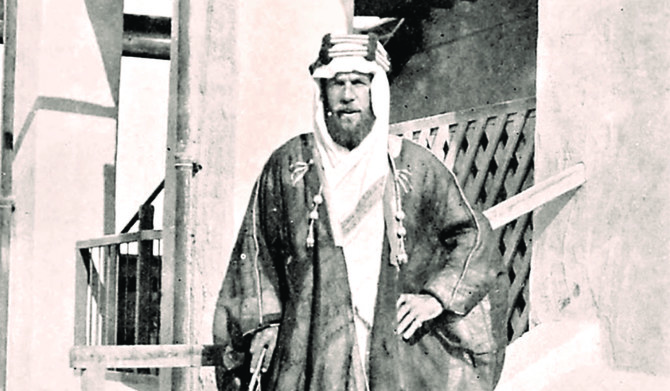
- Some of the specimens he has gathered are held in the British Museum in London,” Sara told Arab News
JEDDAH: As the granddaughter of the renowned explorer Abdullah Philby, Dr. Sara Faris Abdullah Philby’s decision to pursue her medical education in Saudi Arabia echoes the pioneering spirit that defined her grandfather’s historic exploration of the Arabian Peninsula.
In honoring her family’s heritage, Sara follows in the footsteps of Sheikh Abdullah Philby, whose multifaceted contributions continue to inspire generations.
“My grandfather led a truly remarkable life,” Sara told Arab News. “From his legendary expeditions to his conversion to Islam, his influence extends far beyond our family.”

She said he has had a profound impact on her life: “Simply contemplating his image fills me with warmth and optimism. My grandfather, Abdullah, possessed a rare combination of traits — uniqueness, dedication, and punctuality — that set him apart. As an explorer and writer, he navigated uncharted territories with grace and determination, leaving an indelible mark on history.”
Who was Abdullah Philby?
Harry St. John Bridger Philby, an explorer and Arabist, received his education at Westminster School and Trinity College, Cambridge. After joining the Indian Civil Service, where he mastered several languages including Urdu, Punjabi, Baluchi, Persian, and Arabic, Philby was recruited to Basra in Mesopotamia (modern Iraq) in 1915 by Percy Cox. His service in Baghdad and Basra eventually led to a mission to meet Ibn Saud in Riyadh, a journey across Arabia for which he was awarded the Royal Geographical Society Founders Medal.
HIGHLIGHTS
• Harry St. John Bridger Philby, or Sheikh Abdullah, left behind a legacy as one of the greatest Arabian explorers.
• Over three decades, he embarked on extraordinary journeys, notably crossing the Empty Quarter in 1932, a feat that tested the limits of endurance.
• His granddaughter Dr. Sara Philby pursued her education in Alfaisal University in Riyadh. • After completing a bachelor’s degree in medicine and another in surgery, she was drawn to the intricate world of embryology.
From their first encounter, Philby was captivated by the magnetic personality of Ibn Saud, and the two formed a friendship that lasted 36 years. Despite his involvement in business and writing, Philby’s true passion lay in exploration. Over three decades, he embarked on extraordinary journeys, notably crossing the Empty Quarter in 1932, a feat that tested the limits of endurance.
Traveling by camel and later by Land Rover, Philby meticulously documented his expeditions, recording place names, temperatures, compass bearings, and more. His scholarly contributions earned him high honors from academic societies worldwide.

“He lived to witness a golden chapter in his life, marked by numerous creations of detailed maps, priceless books including unmatched details of his journeys, and contributions to several fields such as history, politics, and wildlife. Some of the specimens he has gathered are held in the British Museum in London,” Sara told Arab News.
As a trusted advisor to Ibn Saud, Philby’s insights and candid opinions were valued by the monarch. His conversion to Islam in 1930 further strengthened their bond, and Philby was bestowed the name Sheikh Abdullah.
In 1960, at the age of 75, Philby died during a visit to Beirut, leaving behind a legacy as one of the greatest Arabian explorers. He was buried in the Muslim graveyard at El-Bouchara, with his son Kim’s inscription on his grave marking his profound impact on exploration and scholarship.
For me, honoring my grandfather’s legacy is not merely a goal but a life purpose.
Dr. Sara Faris abdullah Philby, Alfaisal University graduate
“(He) left behind a spectacular life story and a loving family, led by my beloved uncle Khaled Philby and my beloved father Faris Philby, who would adore him for the rest of time,” Sara said.
His involvement in Arabia during World War I, his close relationship with Ibn Saud, and his pivotal role in the Arab Revolt and the creation of Saudi Arabia highlight his enduring influence on the region's history and culture.
Sara explained that her grandfather’s legacy continues to influence her approach in life and her career in medicine: “His interests in exploration and travel might differ from my academic interests in medicine and clinical embryology. However, that doesn’t diminish his huge impact on my educational decisions.
“With his legacy as a beacon, I am motivated to continuously push myself to new heights, embracing challenges and opportunities for growth along the way,” she added. “His love for history, the desert, maps, and wildlife will forever capture my heart, despite my academic pathway heading somewhere different.”
Sara pursued her education in Alfaisal University in Riyadh. After completing a bachelor’s degree in medicine and another in surgery, she was drawn to the intricate world of embryology.
“My interest in this field stemmed from a personal fascination with reading books on embryology and reproductive sciences,” she noted. “Moreover, I was deeply inspired by the noble goals of this discipline, particularly in addressing infertility and assisting couples in starting families according to God’s will.”
Sara’s religious and cultural background plays a pivotal role in shaping her career aspirations. “As a Muslim, my faith serves as a guiding light,” she affirms. “Islam’s teachings emphasize compassion and kindness, influencing my academic pursuits. The profound references to embryology in the Holy Qur’an have deepened my interest in this field.
“The Holy Qur’an beautifully elucidates the stages of human embryonic development in multiple verses,” she noted. “This further solidified my conviction to pursue a career in clinical embryology and reproductive biology.”
Following her passion, this year Sara graduated from Alfaisal University with a master’s degree in biomedical sciences, specializing in clinical embryology and reproductive biology, achieving first honors.
Speaking about the enriching experience at the university, she said: “Alfaisal University has been an integral part of my life for many educationally fruitful years … I am hopeful for its continued success and prosperity in the future.”
Her journey through academia had its own challenges: “The rigorous demands of the field required unwavering commitment and patience. However, these experiences have shaped me into the person I am today, instilling in me a sense of resilience and determination.
“Embrace the journey, stay true to yourself, and remain dedicated to your goals,” she advises aspiring professionals. “Believe in your abilities and seize the opportunities that come your way.”
Balancing personal aspirations with her family’s legacy is a central theme for Sara. “I place great importance on aligning my personal aspirations with the expectations associated with my family’s legacy,” she explains. “By staying true to myself and honoring my family’s heritage, I find harmony in pursuing my goals.”
As she navigates the complexities of academia and embarks on her own path of exploration, Sara remains steadfast in her commitment to honoring the rich heritage passed down to her by her grandfather.
“For me, honoring my grandfather’s legacy is not merely a goal but a life purpose,” Sara said.
Jeddah to host ALECSO Executive Council, General Conference meetings

- Representatives from 22 Arab countries set to attend
RIYADH: Jeddah is to host the Executive Council and General Conference of the Arab League Educational, Cultural and Scientific Organization.
Ministers and heads of national committees from 22 Arab countries will attend the event, which takes place from May 14-17 and highlights the Kingdom’s commitment to education, culture, and science, as well as its focus on strengthening ties with Arab and Islamic nations.
The event aligns with the directives of Prince Badr bin Abdullah bin Farhan, the Saudi minister of culture and chairman of the Saudi National Commission for Education, Culture and Science.
The Kingdom aims to play a more active role in regional organizations like ALECSO, helping to contribute to its mission while supporting education, culture and science within Arab societies, the Saudi Press Agency reported.
The 121st meeting of the Executive Council is scheduled for May 14-15, while the 27th General Conference will be held on May 17.
Organized by the Kingdom’s National Commission for Education, Culture and Science, more than 145 representatives from Arab countries and related organizations are expected to participate in the meetings.
The General Conference will hold working sessions aimed at improving ALECSO’s programs and initiatives. This approach will seek to empower Arab societies by fostering scientific, educational, cultural, and communication projects that nurture a new generation of Arabs embracing their identity, language, and heritage, while aspiring toward a more innovative and sustainable future, the SPA added.
Saudi CEO to attend Gulf Creatives Conference at Harvard University
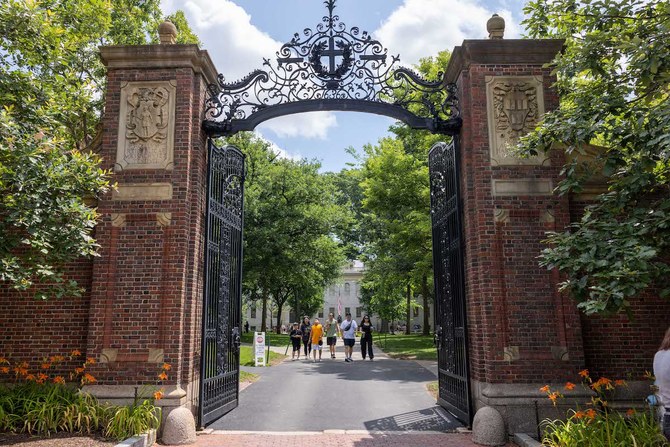
- Al-Fayyadh will articulate the hospital’s vision for the future of healthcare regionally and globally
RIYADH: Majid Ibrahim Al-Fayyadh, CEO of the King Faisal Specialist Hospital & Research Center, will take part in the Gulf Creatives Conference at Harvard University from May 10-12, Saudi Press Agency reported on Sunday.
The conference will be a platform for influential voices from the Arab Gulf nations within the US academic landscape to illuminate the region’s expertise and accomplishments across diverse fields while charting a course for the future.
The conference will draw together distinguished leaders from both public and private sectors across the GCC, embodying the region’s dynamic potential and innovative ethos in sectors including sports, the arts, media, entrepreneurship, technology, non-profit endeavors, public policy, and healthcare.
The event is organized by The Diwan, a student-run organization representing those studying at Ivy League universities.
The GCC event will host 24 discussion sessions and five workshops.
Discussions will cover public policy landscapes, innovation strategies, and the future landscape of healthcare, inviting active participation from all attendees.
During the event, Al-Fayyadh will deliver a keynote address spotlighting the center’s achievements and its pivotal role in advancing Saudi Arabia’s healthcare transformation journey.
Additionally, he will articulate the hospital’s vision for the future of healthcare regionally and globally, underscoring its commitment to innovation and excellence.
Who’s Who: Abdullah Al-Ajmi, space business development director for Lockheed Martin in Saudi Arabia
Who’s Who: Abdullah Al-Ajmi, space business development director for Lockheed Martin in Saudi Arabia
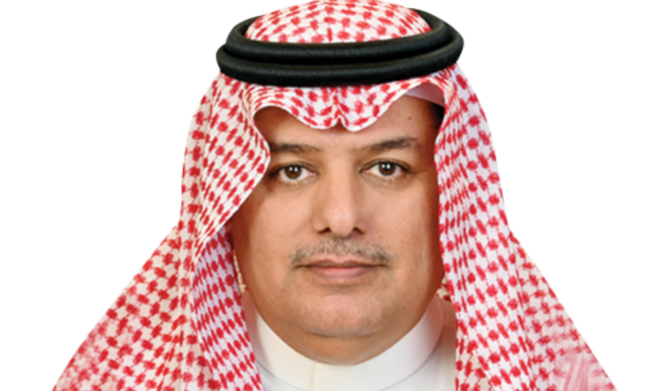
Abdullah Al-Ajmi is the space business development director for Lockheed Martin in Saudi Arabia. He is responsible for coordinating and bolstering the Kingdom’s space efforts.
In addition to fostering strategic cooperation between government and commercial enterprises, Al-Ajmi oversees the facilitation of scientific experiments and international research collaborations, as well as the administration of future space-related missions.
A retired brigadier general of the Royal Saudi Air Force and Ministry of Defense, he has a wealth of expertise and experience in remote sensing and intelligence, surveillance, and reconnaissance and space systems.
He has also served as the ministry’s satellite directorate director and participated in several space committees facilitated by the Kingdom and the Gulf Cooperation Council for almost two decades.
With an illustrious career spanning over two decades, he has contributed significantly to a range of committees and projects. He served on the RSAF intelligence, surveillance and reconnaissance and space committees and was also part of the F-15SA RSAF program under the RSAF and US Air Forces partnership.
In his previous roles, he demonstrated exceptional leadership as the head of the technical group for several ISR and space systems. Throughout his career he has been actively involved in the RSAF UAV committee, the Saudi-French Space Technical Group, Saudi/UK reconnaissance projects and the Saudi-US Armament committee.
Al-Ajmi holds a bachelor’s degree in mass communication from King Saud University. He then graduated as a military officer from King Faisal Air Academy and earned a master’s degree in military use of remote sensing from Oklahoma State University in the US.
French classical concert tour for children in Saudi Arabia comes to an end

- Audience was mostly made up of parents with young children
- Concert was organized by Alliances Francaises in partnership with the French Embassy in Saudi Arabia and other French organizations
ALKHOBAR: Fresh from performances in Riyadh and Jeddah, the Concert Impromptu, a classical ensemble made up of French musicians that was established in 1991, journeyed into Alkhobar on Saturday for the final stop on a tour presenting a program designed specially for children.
There was a palpable energy at the concert, which was held at the newly opened Saudi Music Hub space, a colorful cluster of buildings near the corniche.
Yves Charpentier played the flute; Violaine Dufes the oboe; Jean Christophe Murer the clarinet; Emilien Drouin the French horn; and Vincent Legoupil the bassoon.
They started with Mozart, who had famously started off composing as a child, and then went on to other classical compositions that they joked were possibly something the audience had heard previously only as somebody’s ringtone.
The audience was mostly made up of parents with young children.
One such attendee was Abul Fahimuddin, who recently moved to Dhahran with his wife, Joana Macutkevic, and their two young daughters. As soon as he heard about the concert, he immediately signed them all up.
“Me and my family have just arrived from Norway several months (ago) … we came to know there is a music concert. We're very keen on what’s happening in the Alkhobar area because we’re living here in Aramco Camp,” Fahimuddin told Arab News.
His two daughters, dressed in pretty blue and white dresses, were plainly delighted to be there.
“I’m excited to see what instruments will be played and how the theater will look. I used to play piano but because of (the pandemic), I had to stop my piano lessons,” Kaja, 11, told Arab News before the show.
Stella, 8, who likes to sing, was giddy. “I’m also excited — like Kaja,” Stella said. “Now in my school, we started to play the xylophone.”
The Fahimuddin family came to the concert to enjoy the experience, but also with the aim to connect with other families that have recently arrived in the Kingdom and to be part of the budding creative community in the area.
“Music is a universal language; we don’t need to speak the same language to enjoy and feel the same atmosphere and the vibe,” Macutkevic told Arab News. “And, for the girls, hopefully the concert will make them more curious about the instruments and about the music,” she added.
Each musician took the time to playfully interact with the audience, and took the time to ask and answer questions and to explain what each instrument was and how to play it.
While the musicians played as an ensemble, they also had solo parts and, at the end, Dufes took the lead, instructing the audience to snap their fingers, clap and make specific sounds while her fellow musicians played along.
“Now you are all musicians,” she told the crowd at the end, to roars of laughter.
The event was organized by Alliances Francaises in partnership with the French Embassy in Saudi Arabia and other French organizations.





